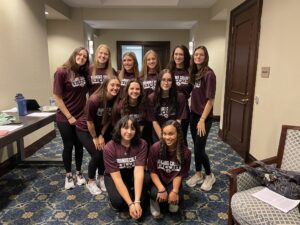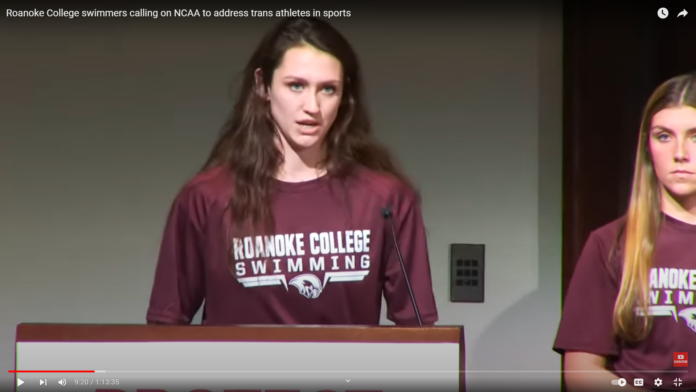As reported in Part 1, in a move hailed as “historic” and “first in the nation,” members of the Roanoke College women’s swim team held a press conference at Hotel Roanoke on October 5 to highlight the emotional, mental, academic and physical trauma they have been experiencing this semester.
In essence, the women were protesting a student who swam for Roanoke College on the men’s team two years ago, took a year off to experience a sex change, and then returned this semester to swim on the women’s team.
Award-winning swimmer and woman’s rights leader Riley Gaines opened the press conference by putting Roanoke College administrators and other “adults” who failed their students on full blast.
(According to the Roanoke College website, the current yearly total for tuition, room and board is $ 52,140.)

Gaines: “What politicians, unelected ideologues, and the authority figures at Roanoke College are doing, is actively working to undermine Title IX [the 1972 law prohibiting sex-based discrimination in school programs] by allowing females to be displaced by males who merely claim the identity of a woman…. Allowing males to compete on a woman’s team is and always will be unfair, and the burden should not be placed on female athletes to convince their schools to accept this scientific reality, but that’s where it is being placed.”
“And we as women are being silenced. Our universities and institutions are gaslighting and emotionally blackmailing us into making us feel like the oppressors. They want us to feel guilty for demanding fairness.”
“There are so many tears, and so many frustrated women in sports right now, and too many aren’t visible. We know rules like these aren’t fair, and it really only takes common sense to see it. And it shouldn’t really take bravery or courage to see that…. And if leaders cannot find that in themselves to do that, then we need different leaders. Our next generation of girls needs to see themselves as champions, and we all need to find our voices.”
“And I am so proud to stand shoulder to shoulder with so many brave women in this fight, but especially this team, and these amazing girls who are all gathered around to support.”
Gaines then introduced the swim team, who filed onto the stage, at which point the audience rose to give a standing ovation. Beginning with the three team captains, each individually told her story.
Captain Lily Mullens went right to the point. “Common sense should have prevented us from needing to stand here in front of all of you today, but instead of being silent, we are courageously sharing our story.”
“The women of the Roanoke College women’s swim team, myself included, came back to school this year, hoping for a season that could be our best one yet. After a second place finish at our conference meet last year, we were motivated to work hard through the summer, so we could win this year.”
“However, that motivation quickly dissipated when we learned about the situation that would soon consume us, mentally and emotionally. We were told that a biological male swimmer would be joining our women’s team.”
“As our school year began, we were left in the dark, and felt like no matter what we said, no matter what legitimate concerns we brought forward, we were met with the poor advice to ‘remain patient.’ There were conversations being had by the people at the top who were going to control what was going to happen to us.”
“I sat in meeting after meeting with my teammates, without getting concrete answers. Some of these meetings lasted over two hours, leaving me drained and unable to focus on the things that I needed to get done for school. I spent hours looking at blank sheets of paper, hoping that the math I needed to turn in the next day would write itself.”
“Most nights I gave up on homework and went to bed (…) but my mind would not let me sleep. The feelings of angst never disappeared. I questioned my purpose for swimming, a sport that I have competed in for fifteen years now. The reason why I spent all that time in the water became unclear.”
“Why would I even try to swim if I was going to have to race against a biological man? My defeat was written in biology at that point. There was not heart or grit that could overcome the laws of nature.”
“I soon learned that I was not the only one that felt this way. In private conversations with my teammates, I found that we were all experiencing the same anxiety, heartache, and overall fear.”
“When we finally worked up the guts to talk to the higher-ups at our school, we were told that we had support, but not once was that support exhibited to us in practical terms. We sent emails that got ignored. We had conversations that ended without any advice or solutions given to us, and not a single administrator came to us asking how we felt or how we were holding up, after the integrity of our sport was ripped away from us.”
“We needed to have advocates, adults and leaders, defending that we deserved to be treated fairly. We needed to know that our sports and hard work were not meaningless to everyone. But instead, we were left to sit with our thoughts, alone and unheard.”
Mullens then did grant the school administrators a shred of credibility, by claiming they were simply “following policy” given by the NCAA.
[Although on a vastly different magnitude, students of history will know that, during the Nuremburg Trials and denazification of Germany after WWII, the most common excuse given for the most horrific atrocities was, “I am not responsible; I was simply following orders.”]
Mullens claimed NCAA policy “tosses women like us aside, like an afterthought. Throughout this entire experience, people in power with positions to make change did nothing. Nobody wants to stand up for women.
“The rule makers have allowed my team to be manipulated, blindsided and pressured into silently accepting unfair treatment and unfair competition…. We were emotionally blackmailed and asked to carry the responsibility for other people’s mental health and well-being at the expense of our own.”
Mullens wrapped up by exposing the common absurdity that people use “inclusion” as an excuse for discrimination and exclusion. She then blasted NCAA and Swim USA administrators for their blatant inaction, injustice, uselessness, and neglect.
Mullens finished with this flourish: “Let our story be the final one told. I am calling on the NCAA and lawmakers everywhere to stop the suffering and emotional turmoil that is being placed on girls. I stand with female athletes everywhere.”
Stay tuned: More of the swimmers’ stories coming in Part 3.
–Scott Dreyer
Correction 10-12-23. The original story reported “Title XI,” but that is incorrect. It has been corrected to “Title IX.” The Roanoke Star regrets the error.

